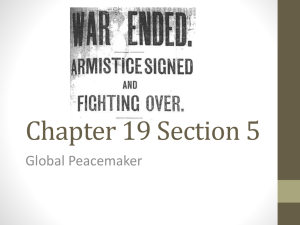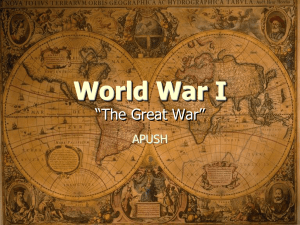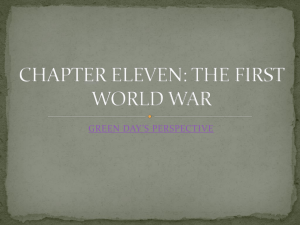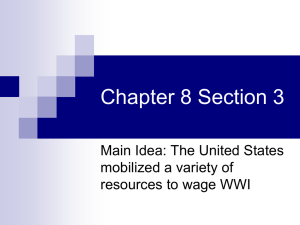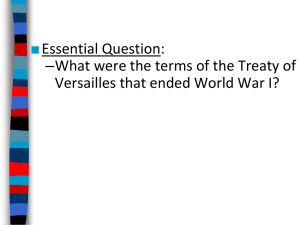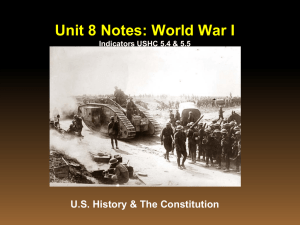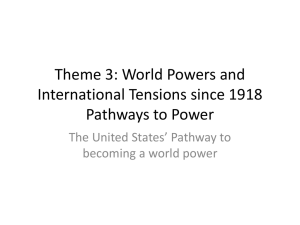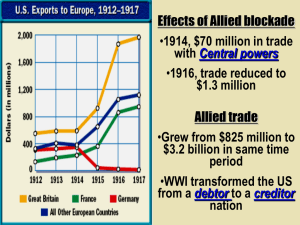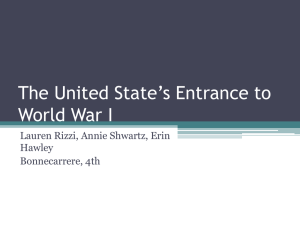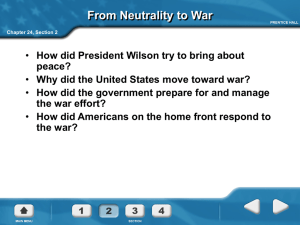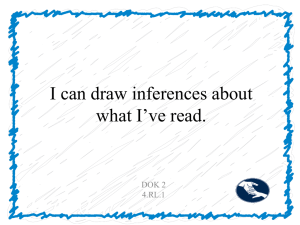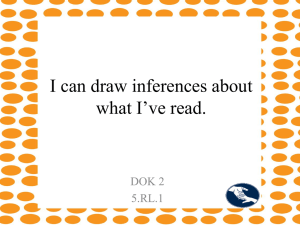Document
advertisement
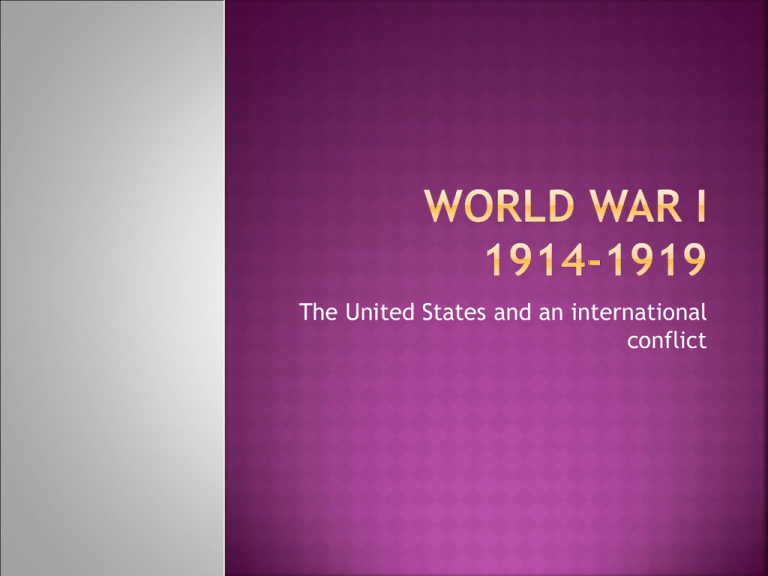
The United States and an international conflict Besides contributing our ungrudging moral and practical support to the establishment of peace throughout the world, we must actively and intellectually prepare ourselves to do our full service….. President Woodrow Wilson 1916 Which international action was influenced by the goals of President Wilson? A. The rejection of the Treaty of Versailles. B. The containment of Soviet military forces. C. The requirement of war reparations. D. The establishment of the League of Nations. 3E BASIC DOK 2 Besides contributing our ungrudging moral and practical support to the establishment of peace throughout the world, we must actively and intellectually prepare ourselves to do our full service….. President Woodrow Wilson 1916 Which international action was influenced by the goals of President Wilson? A. The rejection of the Treaty of Versailles. B. The containment of Soviet military forces. C. The requirement of war reparations. D. The establishment of the League of Nations. 3E BASIC DOK 2 The question in every case is whether the words used are used……to create clear and present danger that……will bring about the substantive evils that Congress has a right to prevent….When a nation is at war, many things that might be said in a time of peace…..will not be endured so as long as men fight, and …..no court could regard them as protected by any constitutional rights. How did this ruing alter behavior with United States society? A. Public debates concerning issues of national security were no longer tolerated. B. Critical comments regarding the governing party were no longer tolerated. C. Legal scholars were targets of investigations during national crisis. D. Civil liberties were subject to interpretation during national crisis. 1D DOK 3 Proficient The question in every case is whether the words used are used……to create clear and present danger that……will bring about the substantive evils that Congress has a right to prevent….When a nation is at war, many things that might be said in a time of peace…..will not be endured so as long as men fight, and …..no court could regard them as protected by any constitutional rights. How did this ruing alter behavior with United States society? A. Public debates concerning issues of national security were no longer tolerated. B. Critical comments regarding the governing party were no longer tolerated. C. Legal scholars were targets of investigations during national crisis. D. Civil liberties were subject to interpretation during national crisis. 1D DOK 3 Proficient Which post World War I policy conflicted with the United States tradition of respecting individual liberty? A. Encouraging people to enlist in the military. B. Placing taxes on the consumers for luxury goods. C. Encouraging people to ration goods for the military. D. Setting quotas on immigrants from specific regions. 1D DOK 2 Proficient Which post World War I policy conflicted with the United States tradition of respecting individual liberty? A. Encouraging people to enlist in the military. B. Placing taxes on the consumers for luxury goods. C. Encouraging people to ration goods for the military. D. Setting quotas on immigrants from specific regions. 1D DOK 2 Proficient 3RD PROGRESSIVE PRESIDENT TR GAVE HIM THE ELECTION PRESIDENT DURING WORLD WAR I WHAT WAS THE SPARK THAT STARTED THE WAR? June 28, 1914, when Archduke Francis Ferdinand and his wife Sophie were killed by a terrorist group called the BLACK HAND. The shooter’s name was Gavarilo Princip. WWI 1914-1919 A. Imperialism—there was a scramble for colonies in the late 1800’s this created bitter rivals and a need to outdo other nations. B. Militarism-this was aggressive building up of a nations military, of course, this meant preparation for war. AustriaHungary, France, Germany, Russia and Great Britain were the major world Powers of the time and they were all competing militarily. The Major Players: 1914-17 Allied Powers: Central Powers: Nicholas II [Rus] Wilhelm II [Ger] George V [Br] Victor Emmanuel II [It] Pres. Poincare [Fr] Enver Pasha [Turkey] Franz Josef [A-H] C. Secret Alliances—nations wanted to bolster their security and they enter numerous entangling alliances which led to war. D. Nationalism—2 kinds: (1) countries were prideful and acted in their own self interest, and (2) In countries with diverse populations— many ethnic minorities declared independence. E. June 28, 1914, Archduke Francis Ferdinand and his wife Sophie, were gunned down in the streets of Sarajevo, Bosnia. Gavarilo Princip, a Bosnian Nationalist was responsible. He believed that Austria-Hungary had no right to rule over Bosnia. The Assassination: Sarajevo Archduke Franz Ferdinand & His Family The Assassin: Gavrilo Princip Who’s To Blame? II. HOW DID THE CONFLICT TURN INTO A WORLD WAR? A. June 28, 1914 the Archduke Frances Ferdinand is assassinated. B. July 28, 1914, Austria-Hungary declared war on Serbia. C. July 29, Russia mobilized acting as Serbia’s protector. D. Germany was Austria-Hungary’s chief ally and they demanded that the Russians stop mobilization—Russia refused. E. France was Russia’s main ally and they started preparing for war as did Germany. F. Russia came to Serbia’s aid. Russia is the mother of Slavic nations. G. Germany wanted to cross Belgium to attack France. Belgium stated that they wanted to remain neutral and did not want Germany crossing their land. Belgium had been granted neutrality by the 75 Year International Treaty signed in the late 1800’s. Germany ignored the neutral position and crossed Belgium to attack France. Germany also declared war on Belgium. This treaty violation angered Great Britain and caused them to declare war on Germany. H. August 1, 1914, Germany declared war on Russia—because Russia aided Serbia I. 1 week after war started there were 2 sides: (1) Central Powers— Germany and Austria-Hungary and (2) Allies-Russia, France, Serbia and Great Britain. WWI A. There was a natural alliance to Great Britain, however the United States was sympathetic with the Central Powers due to a large number of immigrants Germany, Bulgaria, Turkey, etc. Also, Irish Americans were natural enemies to the British. The customs, laws, etc. aligned the United States with Great Britain. Americans started to resent the German’s intense military attitude and character. B. Between 1897 and 1914 the USA had over $3.5 billion dollars of interest overseas—USA wanted to protect their business interests. The essence of United States military action during this time was intended to protect the US neutral rights at sea, especially on the Atlantic. This was very hard to maintain. The Germans violated neutrality with unrestricted submarine warfare. Great Britain was also violating international law by: expanding the contraband list to include food, carrying neutral ships to British ports, and declaring the North Sea a military zone and filling it with mines. Germany realized that Great Britain could starve them into submission so they started ignoring international law. C. August 4, 1914 President Woodrow Wilson officially announced American neutrality. D. America went into a state of “preparedness”. The USA wanted to be in a position to aid Great Britain if the need arose. E. December 1914 The National Security League was formed to promote patriotic education. F. By the summer of 1915—Wilson had men being trained for the US military. G. By the summer of 1916, Wilson had persuaded Congress to increase the size of the military. H. November 1915, a group of men and women formed the American Union against Militarism. I. 1916 Congress increased income taxes. J. Wilson authorized American bankers to make huge loans to the Allies. A. German u-boats were sinking ships. B. A major incident took place on May 7, 1915. The passenger liner ,The Lusitania was struck by a German torpedo, and it sank in less than 18 minutes. 1198 passengers were killed, including 128 Americans. The Lusitania had been flying the American flag and it was later learned that It was carrying ammunition. Nevertheless, the Allies and the United States were outraged by the attack. At this point, Germany urged Americans not to travel abroad because of the dander involved. President Woodrow Wilson defended the right of Americans to go anywhere that they desired. The Secretary of State, Williams Jennings Bryan, disagreed with Wilson on this point and resigned in protest. On September 1, 1915, the Germans issued the Arabic Pledge. Germany agreed not to sink any more unarmed liners, but President Wilson was skeptical. President Wilson began urging Americans to begin preparing itself militarily. UNRESTRICTED SUBMARINE WARFARE THE LUSITANIA C. January 27, 1917 President Woodrow Wilson asked the European nations involved in fighting to consider a “peace without victory.” This proposal was not successful. Germany agreed to the Sussex Pledge agreeing to warn ships before they attacked them. However, on January 31, 1917, Germany declared unrestricted submarine warfare and on February 1, 1917, Germany violated the Sussex Pledge. February 3, 1917 The United States broke off diplomatic relations Germany. Wilson also asked Congress to arm merchant ships. Which one of the following was MOST decisive in changing America’s neutrality to support for the Allied Powers in World War I? A The sinking of the battleship U.S.S. Maine B Unrestricted German submarine warfare C Publication of the De Lomé Letter D Violation of the Polish border by German troops Which one of the following was MOST decisive in changing America’s neutrality to support for the Allied Powers in World War I? A The sinking of the battleship U.S.S. Maine B Unrestricted German submarine warfare C Publication of the De Lomé Letter D Violation of the Polish border by German troops ATTACK USA D. Arthur Zimmerman, Germany’s foreign secretary made a secret offer to Mexico. He asked Mexico to join the Central Powers and invade the United States. This would keep the United States out of World War I. Germany promised Mexico to recover lost territory in Texas, New Mexico and Arizona. The Zimmerman Telegram was captured by intelligence and caused the United States to move closer to war. The first Russian Revolution in March 1917 had caused America to welcome Russia into the ranks of democratic and constitutional states. In November, however, the Bolsheviks had overthrown the moderate Kerensky government and embarked on the Soviet road. RUSSIAN TSAR RUSSIA BECOMES USSR COMMUNIST E. March 1917—Russian Revolution—see handout. Tsar Nicholas was driven from the throne and a communist government was installed under the leadership of Vladimir Lenin. The entire royal family was executed. This new communist government started a Red Scare in the United States. F. Between March 16-18—Germany sank the following US ships: City of Memphis, Illinois, Vigilance. G. On April 2, 1917, President Woodrow Wilson asked the United States Congress for and received a Declaration of War against Germany. On April 6, 1917 The United States declared war on Germany. The vote was 82 to 6 in the Senate and 373 to 50 in the House—in favor of war. H. Wilson no longer spoke merely of neutral rights. He said: “ The world must be safe for democracy Americans must fight for the rights and liberties of small nations and bring peace and safety to make the world itself, free at last.” Trench Warfare Trench Warfare “No Man’s Land” The Airplane “Squadron Over the Brenta” Max Edler von Poosch, 1917 The Flying Aces of World War I Eddie Rickenbacher, US Francesco Barraco, It. Eddie “Mick” Mannoch, Br. Willy Coppens de Holthust, Belg. Rene Pauk Fonck, Fr. Manfred von Richtoffen, Ger. [The “Red Baron”] Looking for the “Red Baron?” Flame Throwers Grenade Launchers Poison Gas Machine Gun A. Congress sent $3 billion in loans to the Allies. B. During the Presidential election of 1916, Woodrow Wilson was the democratic candidate who was the “peace candidate.” He reminded the nation that he was the incumbent President that had kept the nation out of war thus far. The Republican candidate was Charles Evans Hughes. Hughes attacked Wilson’s foreign policy. Hughes felt like the Atlantic violations of US neutrality needed to be taken more serious. This election was the closest presidential election since the disputed election of 1876. General Pershing had 14,500 men serving under him in April of 1917. Pershing recommended that the armed forces total 1 million. When WWI started the USA had only 120,000 men enlisted and 80,000 National Guardsmen. May 1917, Congress passed the Selective Service Act drafting men for military service. Over 24 million men registered for the draft and 3 million served as a result of the draft. The Selective Service Act did not allow the buying of substitutes, all men, ages 21-31, were subjected to selective service. The Selective Service used the lottery system to determine which men would be drafted. By the end of World War I, 24 million men were on the Selective Service rolls. 3 million men went into service. The National Guard was federalized during the war. The total armed forces of the United States during the war numbered nearly 5 million men. Volunteers and National Guardsmen made up the remainder of the American Expeditionary Forces (AEF). D. Over 11,000 women volunteered to serve as nurses, drivers and clerks. E. 14,000 women served abroad working with the government. F. By March 1917 American ships traveled in a convoy. G. Liberty Bonds were sold to finance the war. Over $20 million dollars was raised and over $10 billion was loaned to the Allies. H. Every Scout to Save a Soldier—Boy Scout campaign to promote PATRIOTISM. I. The government started a rationing program. The Food and Fuel Adm. were agencies formed to conserve resources during the war. The food programs were “Meatless Mondays” and “Wheat less Wednesdays.” Victory Gardens were also popular. The less people ate, the more supplies the troops were sent. I. The Clean Your Plate Campaign started during World War I. The fuel program that was started was “Heatless Mondays.” Daylight savings time was started to conserve fuel. J. Sedition Act of 1917 was passed. Schneck v. United States: this was a Supreme Court case that stated that 1st Amendment rights to free speech can be limited when the government is placed in “Clear and Present Danger.” Schneck sent 16,000 letters to drafted MEN ENCOURAGING THEM NOT TO SHOW UP. He was arrested and said that his actions were protected under the 1st Amendment. He was found guilty of sedition. . Industries in the United States were converted to wartime industries. Many wartime necessities were produced by the United States in order to wage war. They were: ships, weapons, money, etc. The government spent over $23 billion on World War I. The government controlled railroads, telephone, telegraph and cable companies during the war. Herbert Hoover, the Director of the Food Administration, urged food conservation. The War Industries Board was given complete control of the nation’s industries, in order to prepare for war. For the first time, women and African-Americans filled opened jobs. There was a growing need for wartime labor. L. The Committee on Public Information was created to build support for the war at home. The government issued propaganda to encourage Americans to support the war effort. Slogans like “Loose Lips Sink Ships” and “Uncle Sam Wants You” were popular. Americans became anti-German during the war. The movies portrayed Germans as the villains and German food, like Sauerkraut became liberty cabbage. M. Three acts were passed during the war that definitely raised questions concerning whether or not civil liberties/rights of the American people were being jeopardized. The Espionage Act of 1917. The Sedition Act of 1917, and the Trading with the Enemy Act of 1917 were passed and strictly enforced. Because the war was so controversial and divisive within the U.S.A. the federal government viewed these acts as being “absolutely essential” to winning the war. The Sedition Act was a direct violation of the First Amendment to the US Constitution. Espionage means to spy for the enemy. Sedition is any act that can incite a movement to overthrow the government. American participation in World War I contributed to the economic opportunities available to African Americans by — A creating a need for African American workers on Midwestern grain farms. B encouraging the African American owners of small businesses to seek war contracts. C inflating the price of cotton and thus increasing profits from sharecropping. D opening up Northern industrial jobs to African American workers. American participation in World War I contributed to the economic opportunities available to African Americans by — A creating a need for African American workers on Midwestern grain farms. B encouraging the African American owners of small businesses to seek war contracts. C inflating the price of cotton and thus increasing profits from sharecropping. D opening up Northern industrial jobs to African American workers. Woodrow Wilson developed the 14 Point Plan—his peace outline. B. January 1919 the Paris Peace Conference was held. C. Wilson’s main goal was establishing a peace keeping organization—he was not interested in the spoils of war. Many US senators wanted spoils of war—Wilson was not concerned with this! A. D. Points 1-5 of the 14 Point Plan included: freedom of the seas, no Secret treaties between nations, and self-determination. Self-determination is the right of countries to determine their own form of government. Articles 6-13 dealt with specific areas in Europe, such as returning land to certain countries and restoring borders. E. League of Nations was formed by the provisions of the 14 Point Plan, however, the United States did not join. Many republican senators (irreconcibles) fought the League of Nations because of Article 10 which stated an attack on one member was an attack on all. F. The Big 4- Georges Clemenceau (French Premier), David Lloyd George (British Prime Minister), Vittorio Orlando (Italian Prime Minister) and Woodrow Wilson (US President) were the main leaders at the Paris Peace Conference. June 28, 1919 Germany signed the treaty. THE BIG FOUR PARIS PEACE TREATY Big Four H. The Treaty of Versailles ended World War I. The Treaty of Versailles included the following terms: 1. Germany’s colonies and the Ottoman Empire were divided among the Allies. 2. New countries were created, such as: Czechoslovakia, Yugoslavia, Finland, Estonia, Latavia, Lithuania, and Poland. 3. Germany was forced to disarm and admit full guilt for the war. Treaty of Versailles 4. Germany was forced to pay billions of dollars in war reparations (war debts) which in later years destroyed their economy and paved the way for Hitler to take over. Article 231 of the Versailles Treaty listed the specific war reparations. Treaty of Versailles 5. The League of Nations was created. It had a general assembly that allowed all nations to be members. The League called on each member nation to stand ready to protect the independence and territorial integrity of other nations. This made many people in the United States oppose the League. The United States was moving back toward favoring isolationism. I. Wilson sought approval of the Versailles Treaty at home—it was not approved. A group of Senators were called the “Irreconcilables” because they block the Treaty’s approval and there was no hope of compromise. The Irreconcilables were members of the Senate that totally rejected the Treaty of Versailles. They wanted absolutely nothing to do with the League of Nations. The thought that the League would force the United States to enter future wars. They wanted to avoid all foreign entanglements. . The Reservationists were a group of Senators who would support the Versailles Treaty and the League of Nations if the treaty and league were amended. However, President Wilson was unwilling to compromise. The United States did not sign the treaty and did not join the League of Nations. This is ironic because they were both Wilson’s ideas J. Wilson was very upset with the Senate and so he went on tour of the United States to convince Americans that they should put pressure on their Senators to sign the treaty. While on tour, he suffered a stroke and was basically bed ridden for the rest of his presidency. The United States never joined the League of Nations Many historians believe that during the months after President Wilson’s stroke that his second wife, Edith Galt Wilson, assumed many of the duties of the President. In the 1920 election, Wilson did not receive the nomination for the Democratic Party and he became extremely depressed. 11 a.m., November 11, 1918 9,000,000 Dead The Selective Service Act was passed by Congress in May of 1917 and was designed to — A create civilian conservation jobs to help people who had lost their jobs in the Depression. B offer interned Japanese American men the opportunity to serve in special military units. C expand the small peacetime army that had existed before the United States entered World War I. D eliminate the old system of government patronage jobs in favor of a new system based on merit. The Selective Service Act was passed by Congress in May of 1917 and was designed to — A create civilian conservation jobs to help people who had lost their jobs in the Depression. B offer interned Japanese American men the opportunity to serve in special military units. C expand the small peacetime army that had existed before the United States entered World War I. D eliminate the old system of government patronage jobs in favor of a new system based on merit. President Wilson’s vision for international policy after World War I is contained in the — A Open Door Notes. B Kellogg-Briand Pact. C Fourteen Points. D Camp David Accords 42. President Wilson’s vision for international policy after World War I is contained in the — A Open Door Notes. B Kellogg-Briand Pact. C Fourteen Points. D Camp David Accords One of the PRIMARY reasons for the United States to build the Panama Canal was to — A force transcontinental railroads to reduce their rates. B decrease the United States Navy’s sailing time between the Atlantic and the Pacific. C fulfill obligations under a treaty with the French. D protect the environment and native cultures of the Central American countries. One of the PRIMARY reasons for the United States to build the Panama Canal was to — A force transcontinental railroads to reduce their rates. B decrease the United States Navy’s sailing time between the Atlantic and the Pacific. C fulfill obligations under a treaty with the French. D protect the environment and native cultures of the Central American countries.
